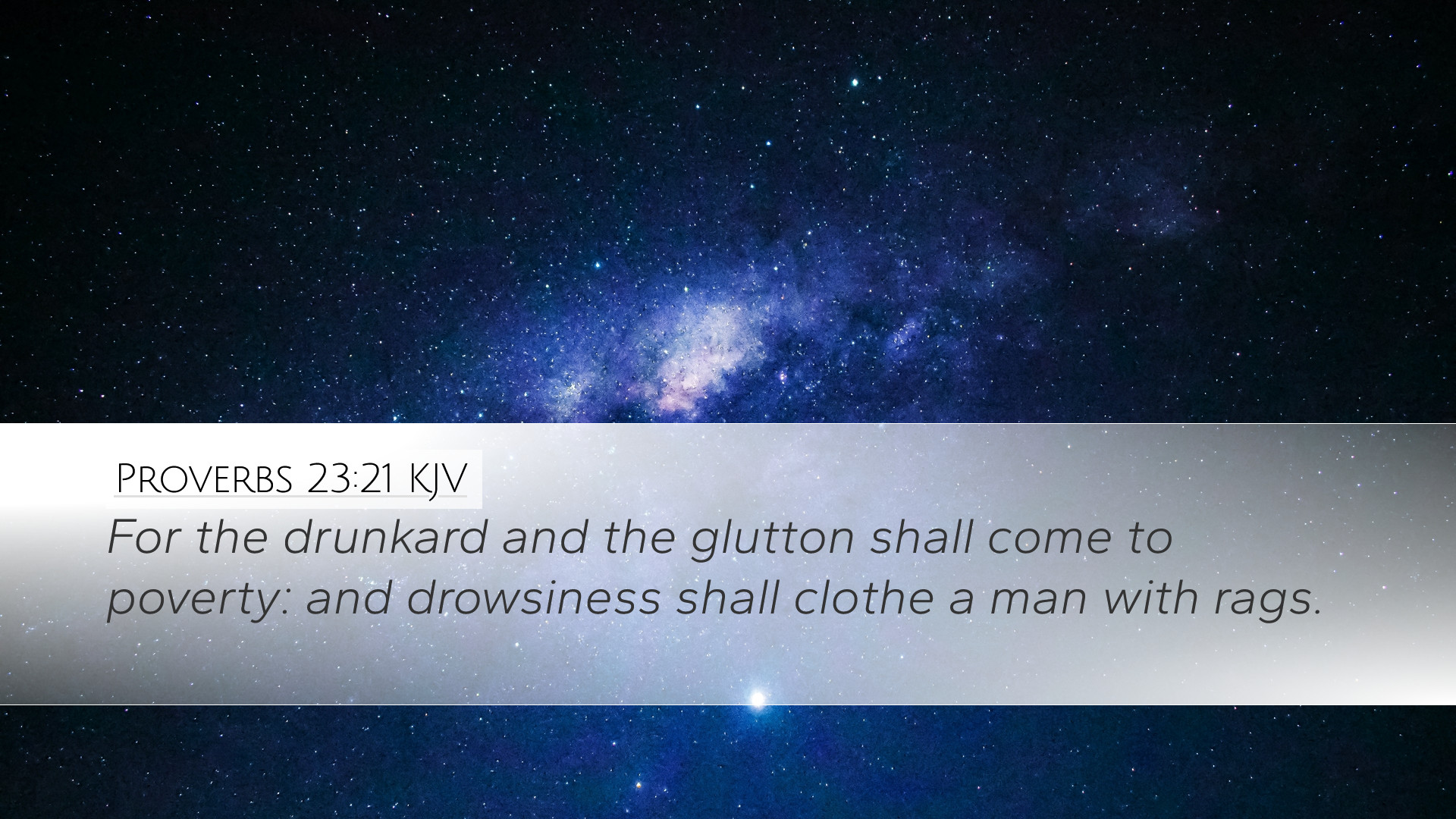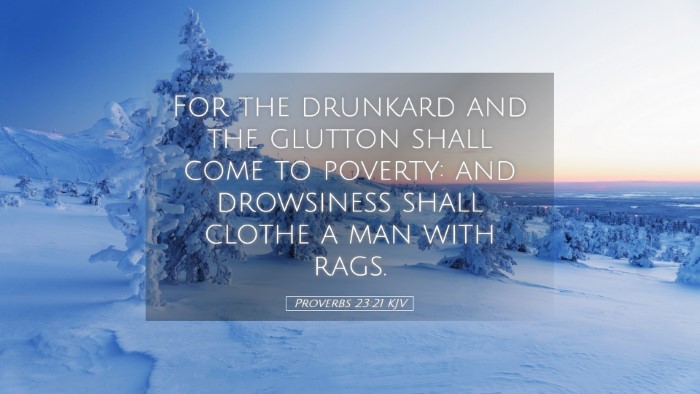Proverbs 23:21 - Commentary Overview
Verse: "For the drunkard and the glutton shall come to poverty: and drowsiness shall clothe a man with rags." (Proverbs 23:21, KJV)
1. Contextual Analysis
This verse is part of a larger discourse in the Book of Proverbs that emphasizes the importance of self-control and the dangers of indulgence. The wise sayings contained in this chapter encourage readers to reflect on the consequences of their actions, particularly in the realm of physical appetites and laziness.
2. Insights from Public Domain Commentaries
Matthew Henry’s Commentary
Matthew Henry remarks that the verse highlights two types of excess: drunkenness and gluttony. He emphasizes that both behaviors lead to dire consequences, specifically poverty and shame. Henry elucidates that indulgence typically results in a lack of discipline, which ultimately leads to one's downfall.
Henry notes that "drowsiness" serves as a metaphor for spiritual lethargy. The implication is that laziness in spiritual matters parallels physical laziness, both culminating in a state of poverty—not only financially but also spiritually. This portrays the holistic nature of Proverbs, where our physical choices directly impact our spiritual well-being.
Albert Barnes' Notes
Albert Barnes provides a practical interpretation of the verse. He explains that "drunkard" and "glutton" signify a life lacking moderation or self-restraint. Barnes asserts that the consequences of such a lifestyle are inevitable; ultimately, one cannot escape the repercussions of their actions. This resonates deeply with church leaders, who must guide their congregations in understanding the necessity of balance and discipline in both lifestyle and spiritual growth.
Barnes further unpackages the idea of drowsiness representing slothfulness, which he states is spiritually disastrous. It fosters an environment where it becomes easy for one to neglect their duties and responsibilities, leading to moral and ethical failures. A wise pastor would take heed of this admonition, applying its truths to shepherd their flock diligently.
Adam Clarke’s Commentary
Adam Clarke offers a nuanced view of the language used in Proverbs 23:21. He highlights that the "glutton" signifies not merely a love of food but of all pleasures that engage the senses. Clarke emphasizes that such indulgence is a moral failing that often leads to a life of misery and poverty. Moreover, Clarke interprets "drowsiness" as a broader warning against neglecting one’s responsibilities — spiritually and socially.
Clarke posits that the call to self-denial is profound; he argues that those who indulge themselves in any capacity are often the first to fall into spiritual and physical destitution. The metaphor of being "clothed with rags" resonates with the notion of being enveloped in shame due to unbridled passions. This can serve as a rich teaching moment for theologians discussing ethics within Christian living.
3. Theological Implications
This verse presents clear theological themes regarding human nature, choices, and consequences. The notion of "poverty" serves as a strong warning about the destructive nature of unchecked desires. From a pastoral perspective, encouraging self-control is crucial. Influencing congregations to seek moderation aligns with overarching biblical principles regarding holiness, discipline, and the avoidance of temptation.
4. Practical Applications
The timeless message of Proverbs 23:21 can be practically applied in the following ways:
- Personal Reflection: Encourage individuals to evaluate their habits and the potential consequences of their lifestyle choices.
- Community Accountability: Establish groups that focus on collective growth in areas of self-control and spiritual vitality.
- Teach the Value of Discipline: Emphasize the spiritual and physical blessings that come from living a disciplined life in contrast to a life of indulgence.
- Prayer and Reflection: Cultivate a culture of prayer that seeks guidance in overcoming temptations of gluttony and sloth.
5. Conclusion
Proverbs 23:21 serves as a sobering reminder of the realities of life. Through insights from esteemed public domain commentators, it becomes evident that indulgence, whether in the form of drunkenness, gluttony, or laziness, brings about ruin and spiritual destitution. For pastors, students, and scholars, this passage remains a call to pursue a disciplined life, rich in spiritual fruit and guarded against needless excess.


